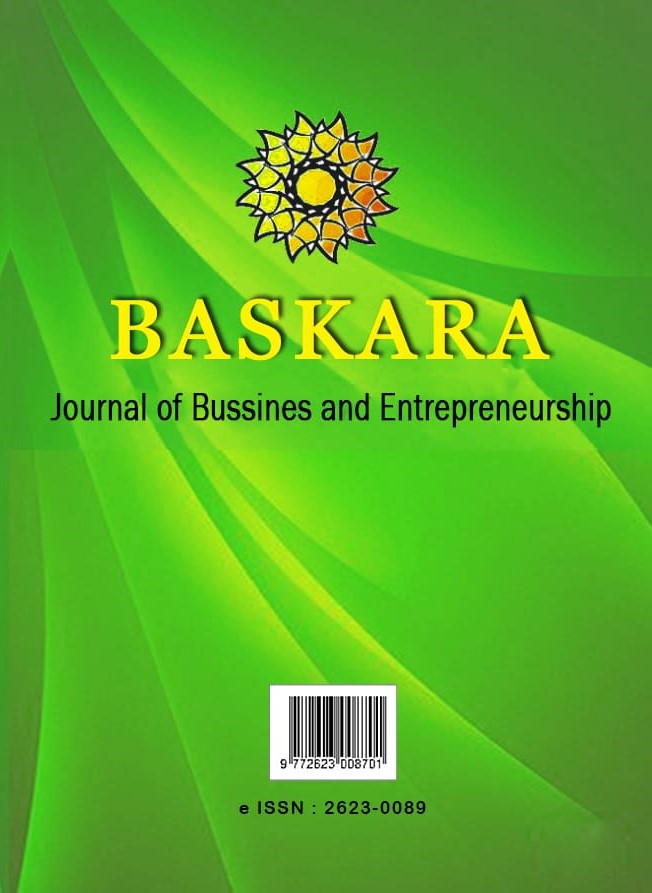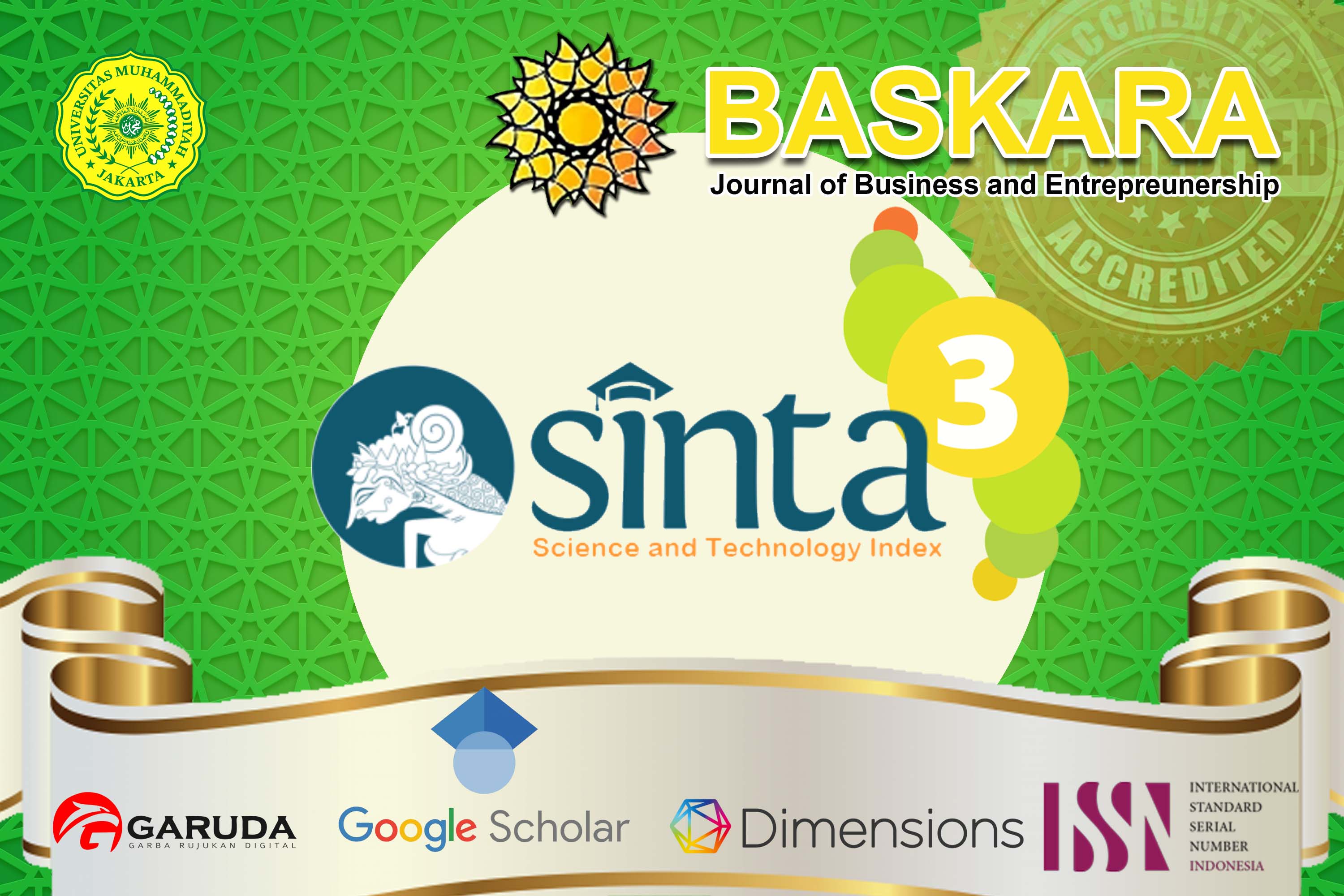Financial Literacy, Income and Self-Control on Financial Management Behavior of Generation Z
DOI:
https://doi.org/10.54268/baskara.v5i2.16363Keywords:
financial literacy, income, self-controlAbstract
In the current era of globalization, economic circulation continues to change and gradually spread throughout the world, including Indonesia. One of the factors influencing these changes is financial behavior. Therefore, financial knowledge is absolutely important the community, because financial knowledge covers how individuals manage their finances properly. Often, individuals fail to manage their finances not because of their low income but because of their ignorance in managing and allocating their finances properly. The purpose of this study was to find out whether there is influence from financial literacy, income, and self-control variables on the financial management behavior of Generation Z, especially students at universities like Muhammadiyah Jakarta. The method used in this study is a quantitative approach with primary data obtained from distributing questionnaires. The data analysis technique used by the researcher uses the classical assumption test, multiple linear regression, T test, and hypothesis test. The questionnaire distribution period was carried out in October–November 2022. The results of this study indicate that the variables financial literacy, income, and self-control have a positive and significant effect on the financial management behavior of generation Z.References
Central Bureau of Statistics. (2022). Retrieved 27 September 2022, from https://www.bps.go.id/publication/2022/06/24/ea52f6a38d3913a5bc557c5f/analysis-profil-penduduk-indonesia.html
Brillianti, F., & Kautsar, A. (2020). Does Financial Literacy Affect Household Welfare in Indonesia? Economic and Financial Studies, 4(2), 103–115. https://doi.org/10.31685/kek.v4i2.541 .
Dwinta, I. and CY (2010). The Effect of Locus Of Control, Financial Knowledge, Income on Financial Management Behavior. Journal of Business and Accounting , 12 (3), 131–144.
Gen Z is dominant, what does this mean for our education ?. (2022). Retrieved September 27, 2022, from https://pskp.kemdikbud.go.id/product/artikel/detail/3133/gen-z-dominan-apa-maknanya-bagi-dinding-kita
Humaira, I. (2017). The Effect of Financial Knowledge, Financial Attitudes and Personality on Financial Management Behavior in Batik Craft Center Umkm Actors. Yogyakarta State University thesis , 129–132.http://dx.doi.org/10.1016/j.biotechadv.2010.07.003%0Ahttp://dx.doi.org/10.1016/j.scitotenv.2016.06.080%0Ahttp://dx.doi.org/ 10.1016/j.bbapap.2013.06.007%0Ahttps://www.frontiersin.org/article/10.3389/fmicb.2018.02309/full%0Ahttp://dx.doi.org/10.1007/s13762-
Ministry of Education and Culture. (2017). Program for International Student Assessment (PISA). Retrieved April 15, 2022, from litbang.kemdikbud.go.id: https://litbang.kemdikbud.go.id/pisa
Kholilah, N. Al, & Iramani, R. (2013). STUDY OF FINANCIAL MANAGEMENT BEHAVIOR IN SURABAYA COMMUNITY . 3 (1), 69–80.
Mellysah, & Nurdin. (2022). The Effect of Financial Knowledge Self-Control and Financial Attitudes on Financial Management Behavior in Millennial Generation. Journal of Management and Business Research , 1 (2), 116–120. https://doi.org/10.29313/jrmb.v1i2.541
Novi Wulansari. 2019. "Department of economics education, Faculty of Economics, Semarang State University 2019."
Noviani, ADE (2021). RIAU ISLAMIC UNIVERSITY THESIS .
Pardede, DAP (2020). Analysis of the Effect of Financial Knowledge and Income on Financial Behavior (Study on Family Financial Decision Makers in Simpang Raya Dasma Village, Panei District, Simalungun Regency, North Sumatra). Thesis , Faculty of Economics and Business, University of Sumatra.
Rachman, T. (2018). Revenue Concept. The Definition of Income , 10–27.
Rikziana, YP, & Kartini. (2017). Analysis of the Level of Financial Literacy and Financial Behavior of Undergraduate Students, Faculty of Economics, Indonesian Islamic University. E - Journal of Janabadra University, 7(1), 76–99. http://ejournal.janabadra.ac.id/index.php/jurnalelek/article/view/249/214
Scheresberg, CDB (2016). Financial Literacy and Financial Behavior among Young Adults: Evidence and Implications Carlo de Bassa Scheresberg . February . https://doi.org/10.5038/1936-4660.6.2.5
Sorong, FA (2022). The Influence of Financial Behavior and Financial Attitude on Investment Decisions With Financial Literature as Moderating Variable. European Journal of Business and Management Research , 7 (1), 265–268. https://doi.org/10.24018/ejbmr.2022.7.1.1291
Indonesian National Financial Literacy Strategy (SNLKI) 2021 - 2025 . (2022). Retrieved September 29, 2022, from https://www.ojk.go.id/id/berita-dan-activity/publikasi/Pages/Strategi-Nasional-Literasi-Keuangan-Indonesia-2021-2025.aspx .
Sugiyono. (2019). Quantitative Research Methods, Qualitative, and R&D. Second Edition. Bandung: Alphabet.
Sutrisno, B., Priharta, A., & Gani, NA (2022). Determinants of Financial Literacy for Undergraduate Students at Muhammadiyah University Jakarta. Civil Journal: Science, Technology, and Humanities , 5 (1), 45–53. https://doi.org/10.33753/madani.v5i1.193
Lestari, IA (2022). The Role of Owner Accounting Knowledge on MSME Performance and The Use of Accounting Information Systems . 47–56.
Yushita, AN (2017). Nominal Journal / Volume Vi Number 1 / Year 2017 The Importance of Financial Literacy for the Management of Personal Finances Amanita Novi Yushita. Nominal , VI ( 1), 11–26.
Downloads
Published
Issue
Section
License
In order for Baskara: Journal of Business and Entrepreneurship to publish and disseminate research articles, we need publishing rights (transfered from author(s) to publisher). This is determined by a publishing agreement between the Author(s) and Baskara Journal. This agreement deals with the transfer or license of the copyright of publishing to Baskara: Journal of Business and Entrepreneurship, while Authors still retain significant rights to use and share their own published articles. Baskara : Journal of Business and Entrepreneurship supports the need for authors to share, disseminate and maximize the impact of their research and these rights, in any databases.
As a journal Author, you have rights for a large range of uses of your article, including use by your employing institute or company. These Author rights can be exercised without the need to obtain specific permission. Authors publishing in Baskara : Journal of Business and Entrepreneurship have wide rights to use their works for teaching and scholarly purposes without needing to seek permission, including:
- use for classroom teaching by Author or Author's institution and presentation at a meeting or conference and distributing copies to attendees;
- use for internal training by author's company;
- distribution to colleagues for their reseearch use;
- use in a subsequent compilation of the author's works;
- inclusion in a thesis or dissertation;
- reuse of portions or extracts from the article in other works (with full acknowledgement of final article);
- preparation of derivative works (other than commercial purposes) (with full acknowledgement of final article);
- voluntary posting on open web sites operated by author or author’s institution for scholarly purposes.
Copyright Transfer Agreement for Publishing (Publishing Right)
The Authors who submit manuscript has to understand that if accepted for publication, mean that all copyright and publishing right of the article shall be assigned/transferred to Baskara: Journal of Business and Entrepreneurship as assigned publisher.
- CC BY-NC: This license allows reusers to distribute, remix, adapt, and build upon the material in any medium or format for noncommercial purposes only, and only so long as attribution is given to the creator.
It includes the following elements:
BY ![]() – Credit must be given to the creator
– Credit must be given to the creator
NC ![]() – Only noncommercial uses of the work are permitted
– Only noncommercial uses of the work are permitted
Baskara (C) Copyright (2022):
BASKARA: Journal of Business and Entrepreneurship by https://jurnal.umj.ac.id/index.php/baskara
is licensed under a Creative Commons Attribution-NonCommercial 4.0 International License








